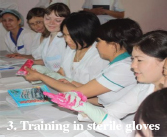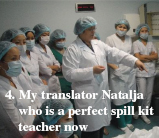|
Abstract: |
Introduction
In July 2009, the WHO identified priority areas in Kazakhstan health care. Finally a project ‘Support for maternal and child health in Kazakhstan’ started, supported by the EU with Euros 1.2 million from the EU budget.
I got a call at the end of January 2011, ‘Are you willing to support the WHO/EU project to improve children’s health in Kazakhstan?’ [1].
Although I am flexible, I thought I heard somebody else answering: ‘YES! When do you need me?’ ‘As soon as possible: nothing to do with medicine functions, even if we have some medicines, sometimes we cannot even do surgery, so babies lose limbs; there is no communication between the healthcare team and most parents have to arrange medicines for their kids from abroad (Russia or Turkey).’
So I found myself on a plane to Astana, the new capital of Kazakhstan, on 28 February 2011. Reading one of the travel magazines, I realised that I could not identify neighbouring countries/regions Afghanistan, Kirgizstan, Mongolia, or Uzbekistan. I finally found Astana on the map, the next biggest city in the north was Novosibirsk and to the south lay the Hindu Kush Mountains.
First impressions
When I got out of the plane I had problems breathing, it was -49°C and I was overwhelmed both by the temperature and the endless taiga.
I was driven directly to the hospital to meet the CEO who told me about the ‘bad pharmacy’ which was definitely guilty of everything. Listening politely I asked him if I might make my own picture and visit my colleagues. I got my translator, Natalja, and guess what: Kazakhstan is just like other places–the pharmacy is far away from the wards, close to the kitchen and in the cellar.
Before showing me round, the Chief Pharmacist asked: ‘Are you a colleague or a spy?’ I asked: ‘Do you expect a spy to spend her holidays in Astana in winter? If you want your professional life to improve, give my translator a call!’
As expected I was invited to visit the hospital pharmacy the next day. The amount of space was impressive and my imagination took flight. But the space was just to store medicines that ran out of stock. I have never felt so frustrated, but to be polite I could not show any reactions.
The situation in Kazakhstan
In 2011, 368.9 billion tenge (Euros 1.9 billion) were provided for the Kazakhstan healthcare sector [2]. Over 10,000 pharmaceuticals are currently registered there. Looking at the list with my translator, I found out within two minutes that not a variety of drugs but dosage and dosage form make this number, and that they do not meet the WHO list of essential medicines for children.
The government grants tenders to its own company which is responsible for buying and distributing medicines. In Europe you get medicines within hours if urgent. Pharmacies in Kazakhstan sometimes wait for months. In these situations families get into debt to obtain basic medicines for their children. When morphine runs out, children may lose limbs or die of sepsis, because surgery is impossible.
President Nazarbayev’s target is to source 50% of medicines, in volume terms, domestically by 2014, although the country has major regulatory gaps. One problem is the absence of local good manufacturing practice (GMP) standards, despite a 2014 GMP compliance deadline. Another is a formulary system [3].
Interestingly, mortality due to cancer is similar to that in western countries, despite the lack of modern chemotherapy. However, life expectancy for men is 63.24 years, for women 74.24 years, about 13% less than in Europe [4].
Finding the problems
They produced ‘sterile’ solutions for neonates under conditions I could not have imagined. When I asked them about their hood, they did not understand, because in Kazakhstan it is the nurse’s job to prepare cytotoxic preparations. So, I asked them to tell me what they do when cytotoxic substances spill. They wipe with paper towels and then place them into the domestic rubbish.
Nobody wanted to accompany me to the haemato-oncology ward, another taboo: pharmacists do not visit the wards. Realising this also applied to me, I had to wait a day to get written permission from the medical director to visit all wards and have access to patient data.
Next day when I went there, they showed me the children’s lessons, to distract me from the ward, see photo 1.
Because I had permission, they had to let me see the ward. I saw children with leukaemia who received a proton pump inhibitor and cortisone, because there was no medicine. Nurses prepared the cytotoxics at the bedside. There where no algorithms for supportive care. And when I asked them to show me their refrigerator I was simply shocked at the lack of medicines.
Teamwork starts
Suddenly I heard German! Dr Aigul Brimova had won a scholarship and graduated at the University of Hannover, where she did her thesis in neoangionesis in solid tumours before and after chemotherapy. She said: ‘Oncology and cancer know no borders, no language, we have to work together to provide supportive treatment and patient education so our patients don’t lose courage.’ She was open and happy to speak German again.
So, I asked her if she could imagine working together with a pharmacist. She answered: ‘Sure, because patient safety is at the centre and I miss the healthcare team I was used to in Germany.’ So, I went back to the pharmacy and asked if anyone was willing to cooperate with the ward, starting slowly but be present and try to learn as much as possible. The first question was ‘Do we get milk?’ At first, I thought I had misunderstood, but the translator explained that in the former Union of Soviet Socialist Republics people working with hazardous substances got condensed milk each day. Sensitised by revelations about the primary testing venue for the Soviet Union’s nuclear weapons in Semipalatinsk people are afraid of whatever might cause cancer.
To their disappointment–no milk. Then they asked me if they could ever get pregnant (again). Despite their reservations, I persuaded a young pharmacist to meet Dr Brimova the next day, see photo 2.
I decided to offer training in sterile glove usage, spill kit and extravasation. My foreign colleagues told me not to expect anybody to take part. It was a pleasure: the whole pharmacy, the oncology nurses and physicians attended. We ran out of chairs, people had to stand, but they stayed to the very end. I had to repeat the training sessions many times over several visits. Theatre nurses also wanted training in sterile gloves, see photos 3 and 4.
Building on trust
Sensibilicised by all my training they made it happen: I was proudly presented with a hood five weeks later, see photo 5.
This was the moment when I knew we could take the next steps, because they trusted me.
I went to that 500-bed university children’s clinic six times in 2011, with a mission to ‘improve the management of a hospital pharmacy, establish quality guidelines, implement treatment algorithms and multidisciplinary education in pharmacology.’ We went through an American hospital accreditation programme—Joint Commission International (JCI) accreditation: pharmacy passed well, also oncology and we are waiting to hear if the first university clinic in central Asia will become JCI accredited after a focussed survey end of February. I am very proud of all those who were so eager to learn and put their trust in me.
Child mortality in Kazakhstan is one of the highest worldwide. To ensure quality will require a complete change in health culture and a step towards western standards. Supervision needs to be combined with training to ensure guidelines are implemented, financial mechanisms need to be revised to avoid incentivising inappropriate practices and to reward virtuous practices such as reduced admission rates, short stays, effective drug supply and appropriate use of drugs. Pharmacy without quality management–especially in oncology services–is unacceptable.
Photo credit: courtesy of Dr Doris Haider
Author
Doris Haider, MBA, PharmD
Sozialmedizinischen Zentrum Süd
Kaiser-Franz-Josef-Spital mit Gottfried von Preyer’schem Kinderspital
3 Kundratstrasse
AT-1100 Wien, Austria
References
1. Jousten N. Improvement of maternal and child health in Kazakhstan. Entre Nous – The European Magazine for Sexual and Reproductive Health. 2011;74:4.
2. Medical market overview. Available from: www.kihe.kz/en/#04
3. Kazakhstan pharmaceuticals and healthcare report Q3 2010. Business Monitor International. Reportsandreports. 2010. Available from: www.articlesbase.com/medicine-articles/kazakhstan-pharmaceuticalsand-healthcare-report-q3–2010-of-business-monitor-internationalnow-available-at-reportsandreports-2868270.html
4. Index Mundi. Kasachstan Lebenserwartung bei Geburt. Available from: www.indexmundi.com/de/kasachstan/lebenserwartung_bei_geburt.html





